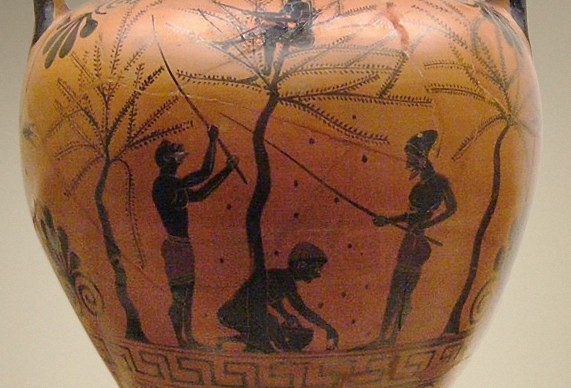APOLLO AND HIS PURPOSE IN SOPHOCLES
Apollo actively intervenes in the fulfilment of Oedipus’ destiny through oracles and immanently in the onstage action. Rather than to punish him for any offence, the god’s purpose appears to be to impress upon Oedipus his existential insignificance. In the context of an ordered but absurd universe, Sophocles emphasises the paradox of the moral greatness of a man whose ‘official’ existential value is less than zero.
Farming in the ancient Greek world: how should the small free producers be defined?
The peasant is often defined as a small self-sufficient producer who employs family labour to work a mixed farm. Living in little rural communities and a specific tradi- tional culture constitute other aspects of his specific situation. Agrarian societies often present social differentiations and involve several rapports between cultivators and the landed gentry.
The Presocratics in the doxographical tradition. Sources, controversies, and current research
Until twelve or fifteen years ago, the study of the Presocratics was not often connected to the study of doxography. The Presocratic philosophers received attention individually, and translations were available. But more recently the Presocratics have been experiencing a renewed interest…
Curtius Rufus, Histories of Alexander the Great, Book 10
Curtius Rufus, Histories of Alexander the Great, Book 10 Edited and translate by J. E. Atkinson and J. C. Yardley Oxford University Press,…
Ancient Greek Religion: Historical Sources in Translation
Ancient Greek Religion: Historical Sources in Translation Edited by Emily Kearns Wiley-Blackwell, 2009 ISBN: 978-1-4051-4927-3 Ancient Greek Religion: Historical Sources in Translation presents…
THE PLATONIC SAGE IN LOVE
How, then, one may ask, can the true philosopher have any truck with the passion of love? It is a basic axiom of Plato’s ethics, after all, that the irrational part, or aspect, of the soul, including the erotic impulse, should be subordinated to the reason, and that the passions, if not entirely eradicated, should at all times be reduced to ‘moderation’ by the exercise of the power of rationality.
HEARD AND UNHEARD STROPHES IN THE PARODOS OF AESCHYLUS
In this paper I would like to suggest a metrical interpretation of the parodos of the Theban girls in Aeschylus’ Seven against Thebes. I shall begin with the metrical part, then I should like to take a closer look at the semantic impact of this interpretation and, instead of a conclusion, show how this proposal would fit into the whole context of the play.
DEMOCRATISATION OF GREEK SOCIETY DURING THE ARCHAIC ERA?
In the modern scholarship of the Ancient Greek history there is a well known and well established conception of an universal democratisation of Greek society during the Archaic and Early Classical periods. It could be summarised roughly as follows:1 Af- ter the fall of the Bronze Age Mycenaean civilisation, in the so-called Dark Ages (11th to 8th centuries B.C.), the Greek communities were governed by the kings (basilees).
THE ARCHAIC BIOGRAPHY OF HOMER
Thus the discussions about which of the epics might have been composed by Homer, as well as the considerations about his person and life seem to have taken place simultaneously, at the end of the 6th century. The increased interest in the person of the poet gives reason to assume that something in connection with those discussions might have also been put down at that time.
The dating of Pheidon in antiquity
The dating of the Argive tyrant (or king) Pheidon, a central figure of early Greek history according to the ancients, has long been one of the most disputed questions in the history of Archaic Greece. The reason is obvious – even in antiquity there was no agreement on this point.
